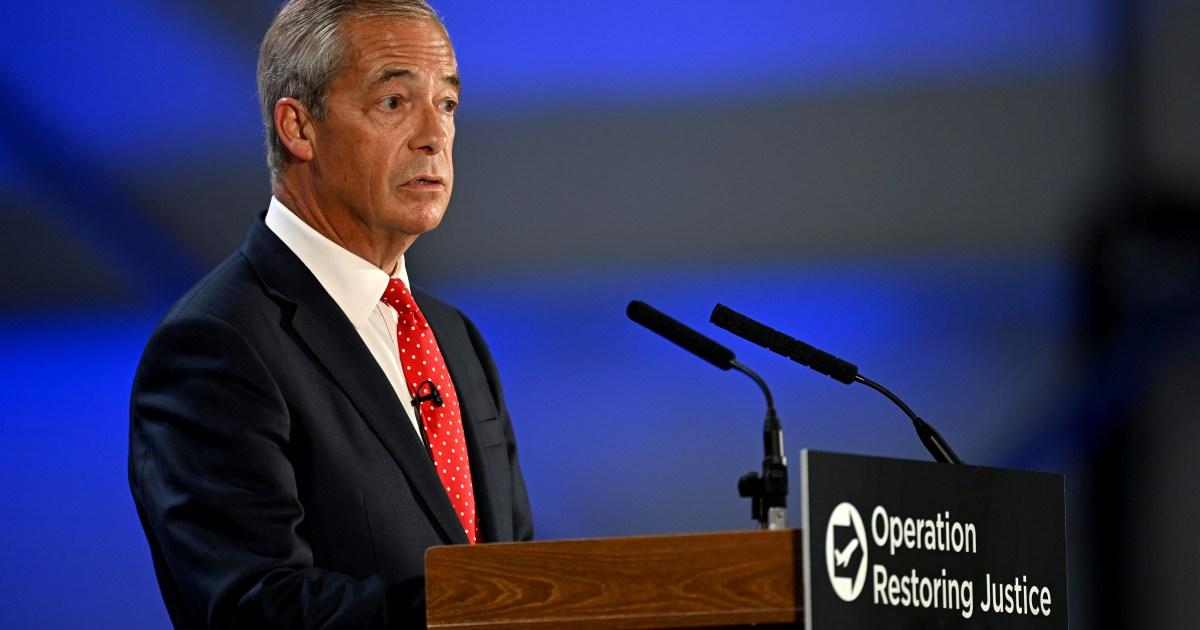Politics
Farage’s Controversial Policies Spark Public Debate on Unity

The political landscape in the UK is becoming increasingly polarized, particularly following recent comments made by Nigel Farage, the leader of Reform UK. Farage’s proposal to deport 600,000 asylum seekers has ignited a vigorous public debate about unity and the role of politicians in society. Many citizens are questioning whether these divisive stances are fostering unnecessary conflict and undermining community cohesion.
In a recent discussion on social media platform MetroTalk, readers expressed their frustration over the growing rift in political discourse. One reader, Tony Howarth from London, emphasized that politicians should strive to bring people together rather than drive wedges between communities. He pointed out that policies like Farage’s only exacerbate divisions, stating, “A politician’s role should be to bring people together, not divide them.”
The backlash against Farage’s proposal is rooted in concerns about its implications for society. Critics argue that his framing of the issue—positioning the safety of women and children against the backdrop of outdated treaties—oversimplifies a complex matter. As Howarth noted, the reality often lies somewhere in the middle, suggesting that a nuanced approach is necessary rather than sweeping measures.
Supporters of Farage’s stance have also emerged, with some proposing that individuals who advocate for asylum seekers should take direct action. One reader, identified as Kris, suggested that those who protest for the rights of immigrants should consider offering shelter to a migrant themselves. This perspective highlights a growing sentiment that activism should extend beyond rhetoric to personal responsibility.
The debate extends beyond immigration policies to broader cultural concerns. Reader G Hume from Sale questioned the apparent contradiction in national pride, pointing out that those who raise concerns about cultural dilution often partake in a blend of global cultures themselves. He asked if it is fair to display national flags while enjoying foreign cuisine or films. This raises questions about how identity and culture are navigated in an increasingly globalized world.
Another reader, John Daniels from Redhill, lamented what he sees as a national aversion to displays of heritage, stating, “We must be the only nation where people are so ashamed of their heritage.” He contrasted this with other European countries where national pride is openly celebrated. This sentiment has resonated with many who feel that expressions of identity are often met with backlash in the UK.
The conversation also touched on the practicalities of everyday life, as highlighted by reader Neil Dance from Birmingham. In response to complaints about public transport announcements, he suggested that noise-cancelling headphones could provide a simple solution for those seeking a more peaceful travel experience. This practical advice underscores the diverse perspectives on how to navigate daily challenges amidst broader societal debates.
In summary, the discourse surrounding Farage’s policies reflects a deeper struggle within the UK regarding identity, unity, and the responsibilities of citizenship. As citizens grapple with these complex issues, the call for politicians to foster inclusivity rather than division remains a central theme. The ongoing dialogue is critical for shaping a cohesive society that values both heritage and diversity.
-

 World2 days ago
World2 days agoCoronation Street’s Shocking Murder Twist Reveals Family Secrets
-

 Entertainment4 months ago
Entertainment4 months agoKate Garraway Sells £2 Million Home Amid Financial Struggles
-

 Entertainment3 months ago
Entertainment3 months agoAnn Ming Reflects on ITV’s ‘I Fought the Law’ Drama
-

 Health3 months ago
Health3 months agoKatie Price Faces New Health Concerns After Cancer Symptoms Resurface
-

 Entertainment3 weeks ago
Entertainment3 weeks agoCoronation Street Fans React as Todd Faces Heartbreaking Choice
-

 World3 weeks ago
World3 weeks agoBailey Announces Heartbreaking Split from Rebecca After Reunion
-

 Entertainment5 days ago
Entertainment5 days agoTwo Stars Evicted from I’m A Celebrity Just Days Before Finale
-

 World5 days ago
World5 days agoKevin Sinfield Exceeds Fundraising Goal Ahead of Final Marathons
-

 Entertainment3 months ago
Entertainment3 months agoCoronation Street’s Carl Webster Faces Trouble with New Affairs
-

 Entertainment3 months ago
Entertainment3 months agoWhere is Tinder Swindler Simon Leviev? Latest Updates Revealed
-

 Entertainment4 months ago
Entertainment4 months agoMarkiplier Addresses AI Controversy During Livestream Response
-

 Science2 months ago
Science2 months agoBrian Cox Addresses Claims of Alien Probe in 3I/ATLAS Discovery





















